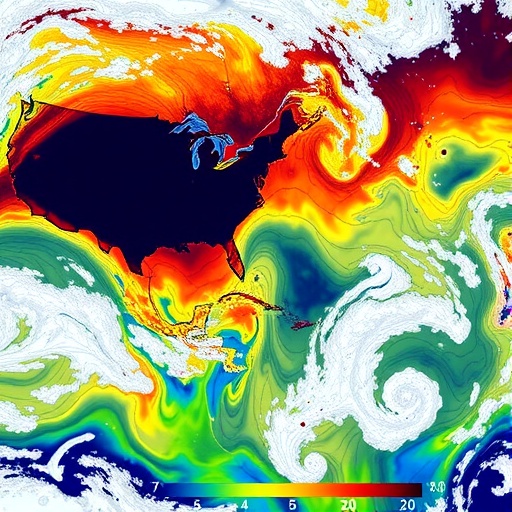In recent years, climate scientists have observed significant changes in the dynamics of the tropical oceans, which play an essential role in global weather patterns. A groundbreaking study, led by researchers including Kim, HR., Ha, KJ., and Roxy, M.K., delves into the recent asymmetric tropical ocean warming and its notable repercussions on the regional propagation of the Madden-Julian Oscillation (MJO). This phenomenon, instrumental in influencing rainfall patterns and storm development across the tropics, has displayed altered behavior over the past few decades. The research provides fresh insights into how these changes may be linked to ongoing global climate trends.
The Madden-Julian Oscillation is a crucial element of tropical meteorology, characterized by large-scale atmospheric circulation patterns that transit eastward around the equator. Normally, this oscillation manifests as a series of moisture waves and convection, which can significantly affect weather variations, including monsoonal rains in South Asia and hurricane activity in the Atlantic. This new study highlights how recent changes in the warming patterns of tropical oceans are already causing shifts in the strength and patterns associated with the MJO, with potential ramifications for millions worldwide.
One of the striking revelations of this research is the asymmetrical nature of the warming occurring in the tropical oceans. Unlike uniform warming, the researchers identified that certain regions of the ocean surface are heating at rates that defy previous models and expectations. This asymmetry raises questions about the traditional understanding of ocean-atmosphere interactions and their roles in global weather patterns. As a result, the propagation speed and strength of the MJO fluctuations are affected, suggesting that these observed deviations from the norm are aligned with wider climatic shifts.
The researchers utilized extensive datasets, covering various geographical regions and employing sophisticated climate models, that allow them to simulate ocean-atmosphere interactions with unprecedented accuracy. The findings indicate distinct differences in temperature indices between the eastern and western regions of the tropical oceans. This disparity not only alters the dynamics of the ocean as a whole but also affects the atmospheric responses, with cascading effects on circulation patterns that may influence regional climates across vast distances.
An intriguing aspect of this research is its potential to explain why climate models have struggled to predict weather patterns accurately over the recent decades. The traditional models often assume uniform ocean temperatures, failing to capture the intricate dynamics of asymmetric warming. This misunderstanding may have contributed to gaps in forecasting abilities, particularly concerning events like the onset of tropical storms, droughts, and flooding—an alarming concern as climate variability becomes more pronounced.
The study’s authors emphasize the urgency of fine-tuning existing climate models to incorporate these new empirical findings on ocean warming. By doing so, future predictions can become more reliable, which is critical for disaster preparedness and resource management, particularly in regions vulnerable to extreme weather events. As global temperatures continue to rise, understanding how tropical ocean dynamics interact with atmospheric systems will be essential for mitigating risks associated with climate change.
Moreover, the implications of these findings extend beyond immediate weather-related concerns. The impact of altered MJO patterns can influence agricultural yields, water supply stability, and even marine biodiversity. In regions where monsoon rains are crucial for food production, a shift in rainfall patterns could lead to significant socio-economic challenges. Climate resilience and adaptive strategies will need to be developed based on these new insights to ensure that communities can withstand potential disruptions.
The global community needs to take heed of these findings, considering the interconnected nature of climate systems. As we continue to grapple with the repercussions of climate change, investing in research that enhances our understanding of tropical ocean dynamics can provide important guidance for policymakers. The study by Kim and colleagues is a clarion call to recognize the urgency of addressing altered climate patterns, providing a roadmap to navigate an increasingly complex reality.
Next, the research team outlined their further exploration into how these findings may also reshape our understanding of global weather patterns, specifically in relation to El Niño and La Niña events. These oscillations interact with the MJO and are critical determinants of climate variability across the globe. The layered relationships among ocean temperatures, atmospheric feedbacks, and historical weather data create a rich area for further study, which could yield invaluable insights.
Ultimately, while the research sheds light on the new landscape of tropical ocean warming, it also serves as a reminder of the complexities within our planet’s climate system. As interrelated dynamics continue to evolve, our understanding must adapt accordingly. It is hoped that further studies will build upon this groundwork, refining predictive models that account for new phenomena like this asymmetric warming and how it impacts global systems.
In an era marked by climate uncertainties, the crucial connections illustrated in this study could ignite further exploration and lead to ambitious global collaborative efforts aimed at combatting the deleterious effects of climate change. The outcomes of this research may mark a pivotal moment in both climate science and policy, serving as a springboard for future inquiries that can create an adaptive global community prepared to tackle the urgent challenge of climate change.
As the world continues to observe these changes unfold, the essence of resilience against climate impacts lies in collaboration, education, and a deeper understanding of the profound connections between the ocean and atmosphere. Such efforts can ensure that societies are equipped not just to endure, but to thrive despite the challenges posed by a warming world.
Subject of Research: Recent asymmetric tropical ocean warming and its effects on the Madden-Julian Oscillation.
Article Title: Recent asymmetric tropical ocean warming has altered regional propagation of Madden-Julian Oscillation.
Article References:
Kim, HR., Ha, KJ., Roxy, M.K. et al. Recent asymmetric tropical ocean warming has altered regional propagation of Madden-Julian Oscillation.
Commun Earth Environ 6, 663 (2025). https://doi.org/10.1038/s43247-025-02652-z
Image Credits: AI Generated
DOI: https://doi.org/10.1038/s43247-025-02652-z
Keywords: Tropical Ocean Warming, Madden-Julian Oscillation, Climate Change, Weather Patterns, Climate Models, Environmental Impact, Global Climate Dynamics.




